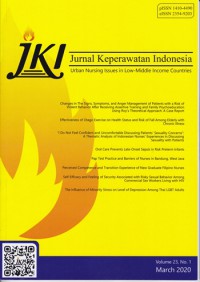
Jurnal
Self-Efficacy and Feeling of Security Associated with Risky Sexual Behavior among Commercial Sex Workers Living with HIV
Commercial sex workers (CSWs) represent a key population for HIV transmission. CSWs continue to thrive because of the development of the tourism sector and the acceptance of communities. This study aimed to identify the factors associated with risky sexual behavior among CSWs living with HIV. A cross-sectional design was adopted. The sample size was set to 80 CSWs living with HIV in the Special Region of Yogyakarta and Central Java. Chi-square and multiple logistic regression were used in the data analysis. Results showed the significant relationship of self-efficacy (p < 0.001; OR = 9.365) and feeling secure (p = 0.033; OR = 2.762) with risky sexual behavior. No significant relationship was noted between income (p = 0.244), knowledge (p = 0.110), attitude (p = 0.978), drug use (p = 0.150), alcohol consumption (p = 0.642), and sexual violence (p = 0.968) and risky sexual behavior. Nursing practices are expected to focus on promotive and preventative efforts by involving communities in enhancing the feeling of security and self-efficacy of CSWs through health programs and improvement of health facilities.
Availability
No copy data
Detail Information
- Series Title
-
Jurnal Keperawatan Indonesia, Vol. 23 No. 1, March 2020
- Call Number
-
(05) 610.5 (910) FAK j
- Publisher
- Depok : Fakultas Ilmu Keperawatan UI., 2020
- Collation
-
Hlm. 64-73
- Language
-
English
- ISBN/ISSN
-
1410-4490
- Classification
-
(05) 610.5 (910) FAK j
- Content Type
-
-
- Media Type
-
-
- Carrier Type
-
-
- Edition
-
Vol. 23 No. 1
- Subject(s)
- Specific Detail Info
-
-
- Statement of Responsibility
-
-
Other version/related
No other version available
File Attachment
Comments
You must be logged in to post a comment
 Computer Science, Information & General Works
Computer Science, Information & General Works  Philosophy & Psychology
Philosophy & Psychology  Religion
Religion  Social Sciences
Social Sciences  Language
Language  Pure Science
Pure Science  Applied Sciences
Applied Sciences  Art & Recreation
Art & Recreation  Literature
Literature  History & Geography
History & Geography